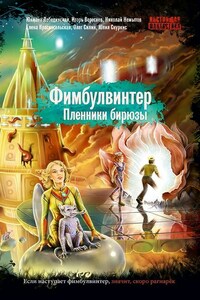"And you're quite sure the place doesn't choke you off?"
"The place? Why, I'd marry you for it alone. It's just sweet!"
Of course it was nothing of the kind. There was the usual galaxy of log huts; the biggest and best of them, the one with the verandah in which the pair were sitting, was far from meriting the name of house which courtesy extended to it. These huts had the inevitable roofs of galvanised iron; these roofs duly expanded in the heat, and made the little tin thunder that dwellers beneath them grow weary of hearing, the warm world over. There were a few pine-trees between the buildings, and the white palings of a well among the pines, and in the upper spaces a broken but persistent horizon of salt-bush plains burning into the blinding blue. In the Riverina you cannot escape these features: you may have more pine-trees and less salt-bush; you may even get blue-bush and cotton-bush, and an occasional mallee forest; but the plains will recur, and the pines will mitigate the plains, and the dazzle and the scent of them shall haunt you evermore, with that sound of the hot complaining roofs, and the taste of tea from a pannikin and water from a water-bag. These rude refinements were delights still in store for Moya Bethune, who saw the bush as yet from a comfortable chair upon a cool verandah, and could sing its praises with a clear conscience. Indeed, a real enthusiasm glistened in her eyes. And the eyes of Moya happened to be her chief perfection. But for once Rigden was not looking into them, and his own were fixed in thought.
"There's the charm of novelty," he said. "That I can understand."
"If you knew how I revel in it – after Melbourne!"
"Yes, two days after!" said he. "But what about weeks, and months, and years? Years of this verandah and those few pines!"
"We could cover in part of the verandah with trellis-work and creepers. They would grow like wildfire in this heat, and I'm sure the owners wouldn't mind."
"I should have to ask them. I should like to grow them inside as well, to hide the papers."
"There are such things as pictures."
"They would make the furniture look worse."
"And there's such a thing as cretonne; and I'm promised a piano; and there isn't so much of their furniture as to leave no room for a few of our very own things. Besides, there's lots more they couldn't possibly object to. Curtains. Mantel-borders. I'm getting ideas. You won't know the place when I've had it in hand a week. Shall you mind?"
He did not hear the question.
"I don't know it as it is," he said; and indeed for Rigden it was transformation enough to see Moya Bethune there in the delicious flesh, her snowy frock glimmering coolly in the hot verandah, her fine eyes shining through the dust of it like the gems they were.
His face said as much in the better language which needs no words.
"Then what's depressing you?" asked Moya brightly.
"I dread the life for you."
"But why?"
"I've been so utterly bored by it myself."
Her hand slid into his.
"Then you never will be again," she whispered, with a touching confidence.
"No, not on my own account; of course not," said Rigden. "If only – "
And he sighed.
"If only what?"
For he had stopped short.
"If only you don't think better of all this – and of me!"
The girl withdrew her hand, and for a moment regarded Rigden critically, as he leant forward in his chair and she leant back in hers. She did not care for apologetic love-making, and she had met with more kinds than one in her day. Rigden had not apologised when he proposed to her the very week they met (last Cup-week), and, what was more to his credit, had refused to apologise to her rather formidable family for so doing. Whereupon they were engaged, and all her world wondered. No more Government House – no more parties and picnics – but "one long picnic instead," as her brother Theodore had once remarked before Moya, with that brutal frankness which lent a certain piquancy to the family life of the Bethunes. And the mere thought of her brother accounted for so much in her mind, that Moya was leaning forward again in a moment, and her firm little hand was back in its place.
"I believe it's Theodore!" she cried suspiciously.
"I – I don't understand," he said, telling the untruth badly.
"You do! He's been saying something. But you mustn't mind what Theodore says; he's not to be taken seriously. Oh, how I wish I could have come up alone!" cried Moya, with fine inconsistency, in the same breath. "But next time," she whispered, "I will!"
"Not quite alone," he answered. And his tone was satisfactory at last. And the least little wisp of a cloud between them seemed dispersed and melted for ever and a day.
For Moya was quite in love for the first time in her life, though more than once before she had been within measurable distance of that enviable state. This enabled her to appreciate her present peace of mind by comparing it with former feelings of a less convincing character. And at last there was no doubt about the matter. She had fallen a happy victim to the law of contrasts. Society favourite and city belle, satiated with the attractions of the town, and deadly sick of the same sort of young man, she had struck her flag to one who might have swum into her ken from another planet; for the real bush is as far from Toorak and Hawthorn, and The Block in Collins Street, as it is from Hyde Park Corner.














